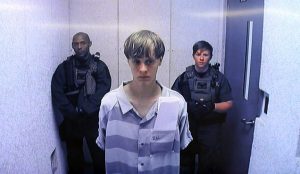
Dylann Roof (Photo by Grace Beahm-Pool/Getty Images)
I have a stock answer when people ask me, “How can you represent people you know are guilty?”
My answer is, “I don’t care if they’re guilty, that’s not my issue.” I compare defense work to the work of a doctor who treats whoever comes into the emergency room, whether it’s Mother Teresa or Adolph Hitler. The doctor’s oath is to save lives. Ours is to help people get out of jail.

Meet Your New Team: Intuit QuickBooks Unveils The Power Of AI Agents For Business Growth
The future of business is here, and it's powered by QuickBooks.
I go on to say that I’m defending everyone’s rights, not just my client’s; that someday, someone they know could be in the defendant’s seat needing a good defense. I can’t just pick innocent people to defend. In the first place, who am I to judge? Next, even if a person is guilty, everybody deserves a defense — someone standing between him and the immense power of the government, someone to explain mitigation when a person is facing a sentence of life or death.
This brings us to the case of Dylann Roof, the young man in the final sentencing phase of his trial in the 2015 murder of nine people at the Emanuel African Methodist Episcopal Church in South Carolina. Roof admitted he did the killings and said he was proud of it. He showed no remorse, compassion, or understanding. Before he was arrested, he’d interacted with online white supremacist groups and reportedly told a friend that “blacks were taking over the world.” According to the lengthy writings found in his jail cell and introduced by the prosecution, Roof wrote, “I have not shed a tear for the innocent people I killed. I am not sorry.”
How does a lawyer defend him? Making it more difficult, Roof has insisted on acting as his own attorney in the death-penalty phase of the case. Given the chance, here’s some mitigation the defense might have proffered. Roof had a rocky childhood. His parents divorced when he was young and he reportedly suffered physical abuse at the hands of his father. He bounced around from school to school, and is said to have suffered from obsessive compulsive disorder, making him fearful of germs and going outside. He frequently smoked pot, used suboxone, and drank alcohol. He couldn’t keep a job and spent hours alone in his room playing video games. He was alienated and mentally ill, and at the mere age of 21 became consumed by hate.
He had been arrested in the past — two times, but only for misdemeanors. One time was for acting oddly at a shopping mall, where he dressed all in black and according to reports was “asking inappropriate questions.” On the other occasion, recognized by the police officer in the first arrest, he was stopped for loitering and found with a firearm grip for an AR-15 semiautomatic rifle and six unloaded magazines. He told police he didn’t actually have a weapon. He bought the gun he’d used in the church shooting with birthday money. The prior arrests didn’t impede his ability to buy the weapon.

AI-Enabled Marketing: Your Secret Weapon for Growing Your Legal Practice
Drowning in marketing to-dos? Learn how firms use AI—the right way—to build lead magnets, rank in AI search, turn referrals into revenue, and craft data-driven business plans.
He now faces the death penalty in two different jurisdictions — state and federal.
Because he’s his own lawyer, it’s uncertain whether he will present any evidence of mitigating circumstances to forestall the imposition of the death penalty. The prosecution has had free reign, meanwhile, to present all the aggravating factors — that the killing involved multiple deaths, that other innocent bystanders could have been killed, that he showed no remorse, that he planned and executed the murders coldly and in a calculated manner, that this was a hate crime aimed only at African-Americans merely because they were black. In its presentation, the prosecution called numerous family members of the victims to the stand who extolled their virtues and spoke of the tragedy of their loss. Defense attorney David Bruck asked the judge to curtail the long list of grieving relatives, saying, “This is a sentencing, not a memorial service.”
Death penalty jurors are a weird skew of people who, many argue, are predisposed toward voting for death. (The anti-death-penalty people are excused from the panel a priori because they could not vote for death.) Yet, they often do not want to give the defendant the punishment he’s looking for. It’s hard to know, however, what Roof would prefer.
In his disturbed state, maybe he’d prefer to die as a martyr for his cause — the savior of the white race — and, in some ways, a life sentence could be a punishment worse than death especially if he is kept in solitary confinement.
On the other hand, who knows if Roof is thinking clearly enough to really want anything except for the 15 minutes of fame he’s already gotten through his act of killing.
Whatever the federal jury decides, it won’t be the last word. Even should he avoid the death penalty federally, he’ll face the same possibility when tried in state court. Maybe by then, the magnitude of the killings he committed will finally sink in and he might ask for forgiveness.
Toni Messina has been practicing criminal defense law since 1990, although during law school she spent one summer as an intern in a large Boston law firm and realized quickly it wasn’t for her. Prior to attending law school, she worked as a journalist from Rome, Italy, reporting stories of international interest for CBS News and NPR. She keeps sane by balancing her law practice with a family of three children, playing in a BossaNova band, and dancing flamenco. She can be reached by email at [email protected] or tonimessinalaw.com, and you can also follow her on Twitter: @tonitamess.